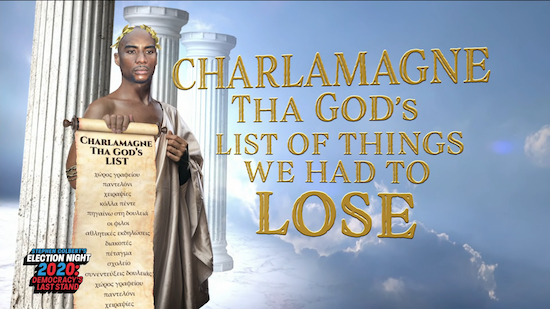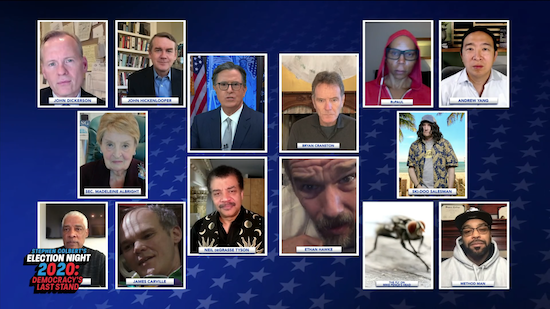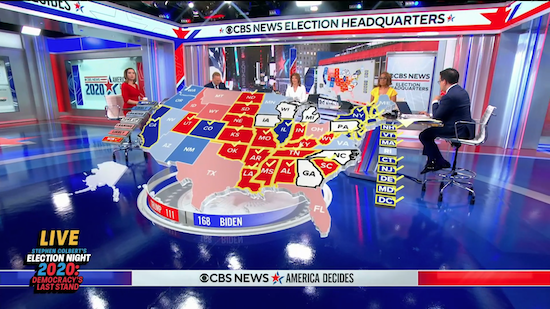Screenshots from Showtime and CBS
As a married couple, living in close quarters through the global pandemic, the U.S. election has proven to be one of the greatest focal points of our shared attention over the last few months. It’s been a tumultuous ride. We often found ourselves trapped on the merry-go-round; “doomscrolling” without end. Frankly, we’d be happy to see this particular circus finally dismantled but there’s still no end to the performance in sight. We’ve attempted to untangle some of the mess of this special 2020 pandemic edition of the U.S. presidential election cycle, and lay out some key points from along the way, seeing if we might find some sobriety and clarity in the aftermath of this political bender.
We woke up around 3am in London to the news that, in the race to the magic winning number of 270 electoral votes, Biden had already secured 131 while Trump sat at 98. As we tuned into Democracy Now with Amy Goodman, it emerged that over 300,000 mailed ballots were still missing, due to the USPS failing to comply with a judge’s order to sweep certain postal facilities in key states for undelivered ballots. In the congressional race, Lindsey Graham held on to South Carolina, with 56.9% of the vote to Jaime Harrison’s 41.7%.
Whilst not surprising news, it was still hugely disappointing given Harrison’s excellent debate performance over Graham. The QAnon espousing Marjorie Taylor Greene won her congressional district in Georgia by a huge margin. Georgia is obviously a Republican stronghold, but it’s still news that’s a little difficult to process. Does this mean that Greene will be working in the House of Representatives alongside people she believes to be part of a secret paedophile cabal? Will she steer clear of ordering any pizza from Pizzagate restaurant Comet Ping Pong? The mind boggles. On the other side, progressives Alexandria Ocasio-Cortez and Ilhan Omar, were both re-elected to the House by similarly large margins. Colorado went to Democrat John Hickenlooper in the first flipped Senate seat of the night – an important win for the Democrats.
At 4am, Stephen Colbert’s Election Special began on Showtime. Colbert has been something of a friendly face for both of us throughout the past few years. With a large bourbon on his desk, and his wife sat across from him nursing a glass of wine, he informed us that Oklahoma had gone to Trump and added (breaking into parody of the song from the famous musical): “Oklahoma… where they don’t care that Trump killed Herman Cain.” A gag with an assembled panel of commentators included Breaking Bad’s Bryan Cranston, who seemed to think he was on a cookery show, and Method Man who noted: “Voter turnout has been higher than it’s been in years… and so am I.”

Colbert greeted the news that Ed Markey won Massachusetts, noting that as he was co-author of The Green New Deal, it’s “fitting Massachusetts has chosen to reuse him”. Charlamagne tha God led a segment where he responded to Trump’s 2016 challenge to black voters of “what do you have to lose”. It was a long list, although not as long as some of the voting lines many Americans have had to endure. Charlamagne delivered the best quip of the night when he considered those lengthy queues and added: “meanwhile, they put a voting booth in space, so a white lady could vote.” He referred, of course, to astronaut Kate Rubins, who has been on the International Space Station since October 14.
At this stage, it was increasingly looking like this closely fought election might again come down to the Rust Belt states as it did in 2016. Colbert asked: “Isn’t that why the Democrats went with Biden? He’s the Rust Belt guy.”
Around 5:30am Florida was called for Trump, putting him up to 174 electoral votes and Biden at 223. A half hour later, Trump took Texas, pushing him up to 212 with Biden still at 223. It was thought that Biden would perform well with seniors in Florida, and while he performed well with that demographic, he clearly hadn’t been able to shake off the label of ‘socialist’ that Trump stuck him with amongst the Latino community. Texas had moved from being a red state to a purple state, but didn’t manage to cross the line into blue.
As the votes continued to trickle in, it seemed likely that the result would come down to the upper midwest states of Wisconsin, Michigan and Pennsylvania, and those would take time to count. Pennsylvania, alone worth another 20 electoral votes, is expected to take at least another day to count the record high number of mailed ballots, which, according to the state’s law, were unable to be opened for counting until election day. With Wisconsin and Michigan leaning toward Trump and Nevada toward Biden, Trump would come up to 239 electoral votes and Biden to 244 if those expectations were met. At this stage it was increasingly looking as the nightmare scenario of Trump challenging postal votes in the courts could decide the election. Indeed, these fears were soon borne out. Around 8.30am UK time, Trump declared victory.

In an election seeing the largest voter turnout since the 1960 Kennedy election where nearly 64 percent of eligible voters cast a ballot, and several key states were still counting votes, the election is far from being called. Before election day had even rolled around, over 100 million votes had already been cast early. Surprised and questioning comments from around the world were made about the long, American voting lines seen in the media. Even in India, with its much larger voting population, such lines were an uncommon sight.
Some British observers scoffed at the American voting process. These long waits in order to vote (sometimes more than ten hours) were not a new phenomena to many parts of the States. Referring to long lines at the polls, former President Barack Obama had even mentioned the need “to fix that” in his 2012 re-election acceptance speech. During his eulogy in 2020 for the great civil rights activist and congressman, John Lewis, Obama took the opportunity to address voter suppression and condemn those in power who were discouraging people from voting, “by closing polling locations, by targeting minorities and students with restrictive ID laws, and attacking our voting rights with surgical precision.” The reasons for the long wait times at the polls were increasingly being seen as clear signs of growing voter suppression.
Mail-in voting was also plagued with obstacles. The pandemic had given plenty of people plenty of reason to cast their votes early by mail, but just weeks before election day, word was spreading across news outlets encouraging people to drop-off their mail-in ballots at official drop boxes to ensure their vote would be counted. During the afternoon of election day, it was reported that a federal judge, Emmet Sullivan, had ordered the US Postal Service to sweep facilities in key battleground states, such as Pennsylvania, Michigan, Texas and Florida, ensuring that any remaining mailed ballots were returned in time. The lawsuit was brought by civil rights groups that filed data showing one in ten pieces of first-class mail, including ballots, was not arriving on time nationally.
Legal fights to determine if ballots could be counted after election day were already in motion in several states. Republican mega donor, Louis DeJoy, had been named postmaster general earlier in the year, causing controversy and upheaval in the postal service. In the months leading up to election day, Donald Trump had stubbornly stuck to false claims that mail-in ballots lead to voter fraud. Mail-in ballots tend to be used by Democrat voters. In late September, after President Trump refused to say whether he would accept a peaceful transition of power, Senator Bernie Sanders warned: “This is an election between Trump and democracy.”
No doubt many people, particularly outside of the U.S. will be looking at the news this morning and asking themselves how on earth the vote could be this close, given Trump’s many failings and more serious wrongdoings during his first term. In fact, so extensive is the list of Trump’s alleged misdemeanours, corruptions and crimes, that this colossal McSweeney’s article includes a colour coded “Atrocity Key”, with red for “sexual misconduct, harassment & bullying”, black for “white supremacy, racism, homophobia, transphobia & xenophobia” and yellow for “collusion with Russia & obstruction of justice.” These are just three of the eight categories but enough to suggest the unprecedented extent of Trump’s offences against the American people and constitution. Every single day seemed to bring new atrocities, each more shocking than those which preceded them.

In mid-September, Trump associate Roger Stone, who had his 40 month prison sentence for witness tampering and obstruction commuted by the president in July, publicly advised Trump that he should seize power and jail prominent enemies should he lose to Joe Biden in the November election. On September 29, in his first debate with Joe Biden, Trump yet again refused to condemn white supremacist groups, this time calling upon the violent, neo-fascist group the Proud Boys to: “Stand back and stand by”.
On October 17, at a rally in Muskegon, Michigan, Trump encouraged his supporters in chanting “Lock her up” after the president demanded that the governor of the state, Gretchen Whitmer, reopen for business during the pandemic. This was nine days after the FBI revealed that it had charged 13 men in an alleged plot to kidnap and potentially kill Whitmer for what they perceived as her overreaction to the pandemic, which limited their personal freedom. On the day that announcement came, Trump had the effrontery to tweet: “My Justice Department and Federal Law Enforcement… foiled a dangerous plot… Rather than say thank you, she calls me a White Supremacist.” Ironically, given their motivation for the alleged plot, Kaleb Franks, one of the six men arrested on federal kidnapping charges, requested that the judge free him on bail because he feared contracting COVID-19 in jail. Two days after that, the Trump campaign appeared to claim that Governor Whitmer was encouraging assassination attempts on the president by appearing in a TV interview with a pin that read ‘8645’ situated in the background. Michigan is one the close states waiting to be called as votes are still being counted.
No, this isn’t the plot to a new series of HBO’s Watchmen, but the actual news from the USA, hard as it may be to believe. Given all of the above, the Trump administration’s scattershot reaction to the COVID-19 pandemic and the appalling treatment by police and armed militia groups of largely peaceful protesters spurred into action by the killing of George Floyd in May, one would think that Trump wouldn’t stand a chance of being re-elected. This unfortunately doesn’t seem to be the case. Trump prematurely declaring victory is a scenario both the media and his Democratic opponents anticipated. With Trump already talking about making his victory speech tonight, media outlets are put in the difficult position of being pressurised to air such an event on the grounds that it is news, whilst also not wanting to provide his falsely declared position with legitimacy. At this stage in the game, all we can do is wait and see how it all plays out.


